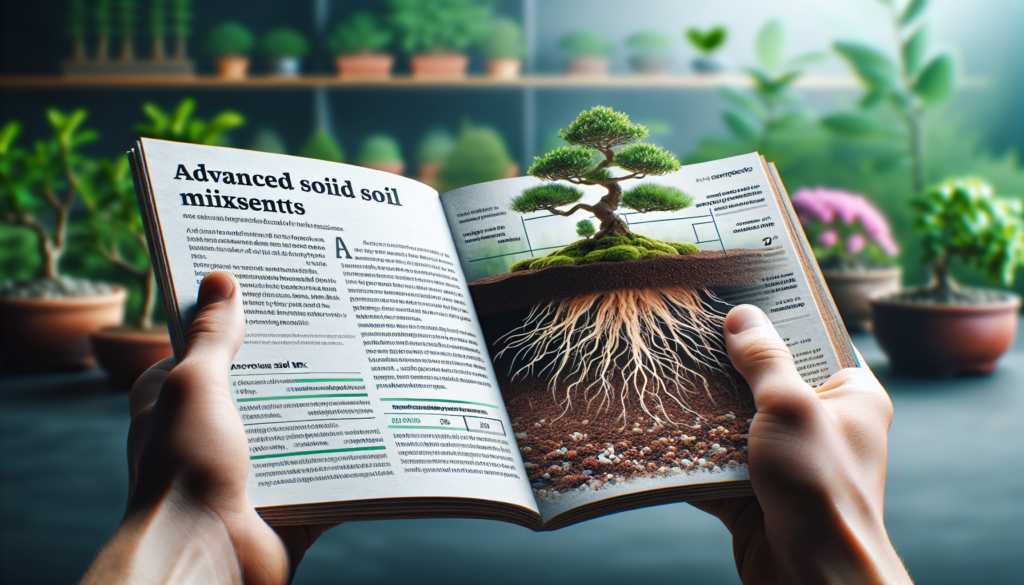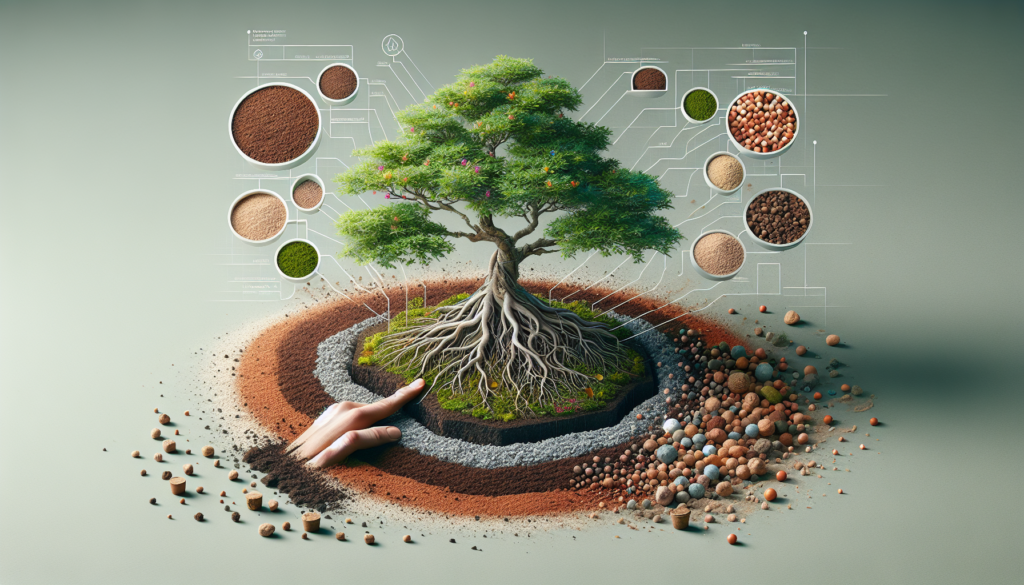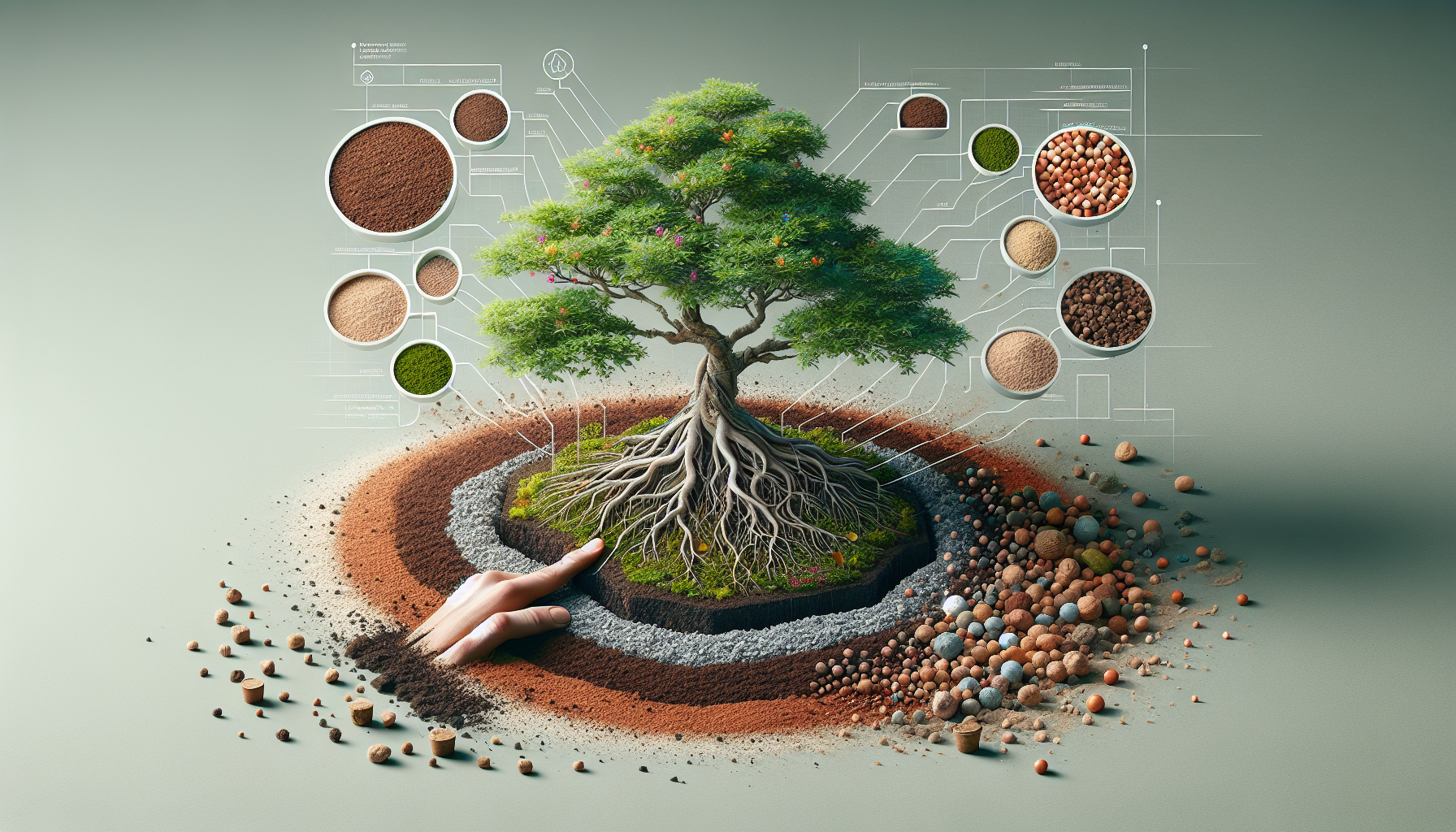Have you ever wondered how to enhance the growth and health of your bonsai trees? Look no further! In this article, we will explore the benefits of advanced soil mixtures for bonsai growth. With these innovative soil mixtures, you can provide your bonsai with the optimal conditions it needs to thrive. Say goodbye to ordinary soil and discover the secrets behind creating the perfect environment for your bonsai’s well-being. Join us as we delve into the world of advanced soil mixtures and unlock the potential of your bonsai trees.

Understanding Soil Needs for Bonsai
bonsai is a delicate art form that requires proper care and attention to ensure the health and longevity of the miniature trees. One crucial aspect of bonsai care is understanding the soil needs of these unique plants. A healthy soil mixture is vital for the development and growth of bonsai trees, as it provides the necessary nutrients, water retention, and aeration for their roots.
Importance of Healthy Soil for Bonsai
Having healthy soil is crucial for the overall well-being of your bonsai trees. The roots of bonsai trees require an optimal growing environment to thrive, and the soil plays a vital role in providing the necessary support and nutrients. A healthy soil mixture promotes strong root growth, aids in nutrient absorption, and enhances water retention. By understanding the soil needs of bonsai, you can provide the ideal conditions for your trees to flourish.
Physical and Chemical Requirements of Bonsai Soil
The physical and chemical properties of bonsai soil are essential considerations when selecting the right soil mixture for your trees. Bonsai soil needs to have excellent drainage to prevent waterlogging, as excessive moisture can lead to root rot and other issues. Additionally, aeration is crucial for healthy root growth, as it ensures the roots receive the oxygen they need.
Chemically, bonsai soil should have a neutral pH level, as extreme acidity or alkalinity can negatively impact the tree’s health. It’s also important to consider the texture of the soil, as bonsai trees prefer a well-draining soil with a good balance between fine particles and larger particles, such as organic matter or volcanic rock.
Nutritional Composition of Soil
The nutritional composition of bonsai soil is another important aspect to consider. Bonsai trees require a balance of essential nutrients to thrive and reach their full potential. The soil should contain nutrients such as nitrogen, phosphorus, and potassium, which are crucial for overall tree health and growth. Additionally, other micronutrients like calcium, magnesium, and iron are also necessary for a healthy bonsai. A well-balanced soil mixture will provide these nutrients to ensure optimal growth and vibrant foliage.
Types of Advanced Soil Mixtures for Bonsai
When it comes to soil mixtures for bonsai, there are several options available. Each type has its own advantages and considerations, catering to the specific needs of different bonsai trees. The three main types of advanced soil mixtures for bonsai are inorganic soil mixtures, organic soil mixtures, and customized or blended soil mixtures.
Inorganic Soil Mixtures
Inorganic soil mixtures primarily consist of inorganic components such as volcanic rock, grit, and akadama. These components provide excellent aeration and drainage properties, which are vital for bonsai trees. Inorganic soil mixtures are popular among bonsai enthusiasts because they have a longer lifespan, are reusable, and help prevent root rot. However, it’s essential to monitor the moisture levels carefully, as inorganic mixtures can dry out faster than organic mixtures.
Organic Soil Mixtures
Organic soil mixtures contain organic components like peat moss, compost, and bark. These components provide excellent water retention and improve the overall nutrient-holding capacity of the soil. Organic mixtures also promote the growth of beneficial soil organisms, such as worms and bacteria, which help break down organic matter and release nutrients for the bonsai tree. However, organic mixtures tend to break down faster and require more frequent repotting.
Customized or Blended Soil Mixtures
Customized or blended soil mixtures are tailored to the specific needs of individual bonsai species or growing conditions. These mixtures often combine components from both inorganic and organic soil mixtures to achieve a balance of aeration, drainage, and nutrient retention. By customizing the soil mixture, bonsai enthusiasts can optimize the growing environment for their trees and ensure the best possible conditions for long-term growth and health.
Composition of Advanced Soil Mixtures for Bonsai
Creating the perfect soil mixture for bonsai requires careful consideration of the ingredients and their proportions. While there is no one-size-fits-all formula, understanding the potential ingredients and how they affect the soil composition can help in creating an optimal blend.
Potential Ingredients for Bonsai Soil Mixtures
Some common ingredients used in bonsai soil mixtures include akadama, pumice, lava rock, peat moss, compost, bark, and sand. Akadama, a type of clay soil, is highly valued for its water retention and aeration properties. Pumice and lava rock are excellent inorganic components that provide drainage and aeration. Organic materials like peat moss, compost, and bark improve water retention and nutrient availability. Sand is often added to improve drainage and prevent compaction.
Balancing Various Soil Constituents
Finding the right balance of soil constituents is crucial for creating the ideal soil mixture for bonsai. The proportions of inorganic and organic components can vary depending on the preferences of the bonsai species and the specific growing conditions. A well-balanced soil mixture will provide adequate drainage, aeration, and nutrient retention to support the healthy growth of the bonsai tree.
Understanding Effects of Different Soil Constituents
Each soil constituent has unique effects on the soil’s properties. Inorganic components improve drainage and aeration, while organic components enhance water retention and nutrient availability. Understanding the properties of each constituent helps in creating a soil mixture that meets the specific needs of the bonsai tree and its growth stage.
Role of Advanced Soil Mixtures in Bonsai Growth
The soil mixture used for bonsai plays a significant role in the overall growth and health of the trees. Advanced soil mixtures provide numerous benefits that contribute to the vitality of bonsai trees and their underlying root systems.
Promotion of Healthy Root Growth
The right soil mixture promotes healthy root growth in bonsai trees. It provides a well-draining environment that allows oxygen to reach the roots, stimulating their development. Additionally, a balanced soil composition helps prevent root rot and fungal diseases, allowing the roots to establish and spread properly.
Aid in Nutrient Absorption
Advanced soil mixtures ensure that bonsai trees have access to a wide range of essential nutrients. The proper balance of organic and inorganic components in the soil allows for effective nutrient absorption by the roots. Nutrients are released gradually into the soil, providing a consistent supply to the bonsai tree, which supports its overall growth and vitality.
Enhancement of Water Retention
Water retention is crucial for the hydration of bonsai trees, especially during dry periods or when watering is limited. Advanced soil mixtures, whether inorganic or organic, are designed to retain an optimal amount of moisture while allowing excess water to drain away. This balance ensures that the bonsai tree receives enough water without being at risk of root rot or water stress.

Benefits of Inorganic Soil Mixtures
Inorganic soil mixtures offer several advantages for bonsai trees, making them a popular choice among bonsai enthusiasts.
Improved Aeration
One of the significant benefits of inorganic soil mixtures is their excellent aeration properties. The inorganic components, such as volcanic rock or pumice, create air pockets within the soil, allowing oxygen to reach the roots. This helps prevent soil compaction and promotes healthy root development.
High Drainage Capacity
Inorganic soil mixtures have a high drainage capacity, ensuring that excess water can escape easily. This prevents waterlogging, which can lead to root rot and other issues. The fast-draining nature of inorganic mixtures allows for more precise control over the soil moisture levels, reducing the risk of overwatering.
Long-lasting and Reusable
Inorganic soil mixtures have the advantage of being long-lasting and reusable. Unlike organic mixtures that decompose over time, inorganic components maintain their structure and properties for a more extended period. This means that inorganic soil mixtures require less frequent repotting and provide a stable environment for the bonsai tree.
Benefits of Organic Soil Mixtures
Organic soil mixtures offer their own unique advantages for bonsai trees, making them a popular choice among bonsai enthusiasts.
Rich in Essential Nutrients
One of the primary benefits of organic soil mixtures is their richness in essential nutrients. Organic components such as peat moss, compost, and bark provide a natural source of nutrients that slowly release into the soil. This ensures that the bonsai tree has a consistent supply of vital elements necessary for growth and overall health.
Excellent Water Retention
Organic soil mixtures have exceptional water retention properties, allowing the soil to retain moisture for longer periods. This is especially beneficial during hot and dry weather conditions or when watering may be limited. The organic components in the soil help create a suitable environment for the bonsai tree to remain hydrated and thrive.
Promotion of Beneficial Soil Organisms
Organic soil mixtures support the growth of beneficial soil organisms such as worms, bacteria, and fungi. These organisms promote the breakdown of organic matter, releasing nutrients and contributing to the overall health of the soil. The presence of these organisms enhances the soil’s fertility and provides a natural ecosystem for the bonsai tree.
Understanding Customized Soil Mixtures
Customized soil mixtures allow bonsai enthusiasts to tailor the soil composition to suit the specific needs of their trees. This personalized approach takes into consideration the bonsai species and its particular requirements.
Tailoring Soil Mixtures for Specific Bonsai Species
Different bonsai species may have varying soil preferences based on their natural habitat and growth characteristics. By customizing the soil mixture, bonsai enthusiasts can create an environment that closely mimics the natural conditions for their tree’s species. This increases the likelihood of success and ensures that the bonsai tree receives the optimal soil composition for its specific needs.
Adjusting Soil Mixture Based on Growing Conditions
Customized soil mixtures also allow for adjustments based on the bonsai tree’s growing conditions, such as climate and location. Soil requirements may differ for bonsai trees grown indoors versus those grown outdoors. By adapting the soil mixture to the specific growing conditions, bonsai enthusiasts can ensure that their trees thrive in their respective environments.
Evaluating the Effectiveness of Personalized Soil Mixtures
The effectiveness of customized soil mixtures should be regularly evaluated to ensure that the bonsai trees are receiving the optimal growing conditions. Observing the tree’s overall health, growth rate, and root development can help determine if any adjustments to the soil mixture are necessary. Regular monitoring and fine-tuning of the soil composition can contribute to the long-term success of bonsai trees.
Comparisons of Different Soil Mixtures
Comparing different soil mixtures helps bonsai enthusiasts make informed decisions when selecting the most suitable soil composition for their trees.
Comparing Organic and Inorganic Mixtures
Organic and inorganic soil mixtures have distinct characteristics that cater to different bonsai species and growing preferences. Organic mixtures provide excellent water retention and nutrient availability, while inorganic mixtures offer improved aeration and drainage. By understanding the differences between these two types of mixtures, bonsai enthusiasts can choose the one that best suits their specific requirements.
Performance of Various Soil Mixtures in Different Climates
Different soil mixtures may perform differently in varying climates and environmental conditions. Some mixtures may be more suitable for dry or arid climates, while others may be better suited for humid or cold climates. Understanding how the soil mixtures perform in different conditions helps bonsai enthusiasts select the most appropriate mixture for their specific climate.
Differences in Cost and Availability of Different Soil Mixtures
The cost and availability of different soil mixtures can also influence the decision-making process. Some soil components may be more expensive or harder to find than others. Considering the cost and availability of the components helps bonsai enthusiasts select a soil mixture that is within their budget and accessible in their area.
Changing Soil Mixture as Bonsai Matures
As bonsai trees mature, their soil needs may change, requiring adjustments to the soil mixture to support their evolving growth.
Considering the Life Stage of the Bonsai
The life stage of the bonsai tree should be taken into account when deciding whether to change the soil mixture. Young bonsai trees may require more frequent repotting and adjustments to the soil composition as they develop. On the other hand, more mature trees may need less frequent repotting but may benefit from changes to the soil mixture to ensure continued growth and vitality.
Signs That It’s Time to Modify the Soil Mixture
Certain signs indicate that it’s time to modify the soil mixture. These signs can include the tree’s overall health, poor drainage, lack of nutrient uptake, or stunted growth. Monitoring the bonsai tree closely and observing any changes in its appearance or behavior can help determine if adjustments to the soil mixture are necessary.
Processes and Best Practices for Changing Soil Mixtures
When changing the soil mixture, it’s important to follow proper procedures and best practices to minimize stress and ensure the well-being of the bonsai tree. Carefully removing the tree from its current pot, gently untangling the roots, and removing the old soil are essential steps. When repotting, the new soil mixture should be added gradually, ensuring that it covers the roots and is firmly but not tightly packed. Following these processes and best practices will help maintain the bonsai’s overall health and promote successful growth.
Long-term Impacts of Using Advanced Soil Mixtures
Using advanced soil mixtures for bonsai can have significant long-term impacts on the health, growth, and overall appearance of the trees.
Impact on Bonsai Health and Longevity
The use of advanced soil mixtures positively impacts the health and longevity of bonsai trees. The proper balance of nutrients, the excellent drainage and aeration properties, and the ability to retain an optimal level of moisture all contribute to the overall well-being of the trees. By providing an ideal growing environment, advanced soil mixtures enhance the bonsai’s ability to resist diseases, pests, and adverse environmental conditions, ultimately extending their lifespan.
Impact on Frequency of Repotting and Pruning
The use of advanced soil mixtures can also impact the frequency of repotting and pruning required for bonsai trees. Inorganic mixtures, with their longer lifespan and excellent drainage properties, may require less frequent repotting than organic mixtures. Additionally, a well-balanced soil composition can promote better root development, reducing the need for extensive root pruning. This can simplify maintenance tasks and ensure that the bonsai tree remains in optimal health.
Effects on Aesthetic Appeal and Growth Patterns of Bonsai
The soil mixture can have a direct impact on the aesthetic appeal and growth patterns of bonsai trees. A healthy and well-balanced soil promotes overall growth and vitality, resulting in vibrant foliage, well-developed branches, and a more natural-looking appearance. By providing the necessary support and nutrients, advanced soil mixtures encourage the bonsai to grow in a desirable manner, enhancing its overall visual appeal.
In conclusion, understanding the soil needs of bonsai trees is crucial for their health, growth, and overall well-being. Advanced soil mixtures, whether inorganic, organic, or customized, offer various benefits that contribute to the vitality and longevity of bonsai trees. By providing the right balance of aeration, drainage, and nutrient availability, advanced soil mixtures promote healthy root growth, aid in nutrient absorption, and enhance water retention. These soil mixtures not only support the bonsai’s overall health but also impact the frequency of maintenance tasks, the tree’s aesthetic appeal, and its long-term growth patterns. By selecting and fine-tuning the soil mixture based on the specific needs of the bonsai species and its growing conditions, bonsai enthusiasts can create an optimal environment for their miniature trees to thrive and flourish.








